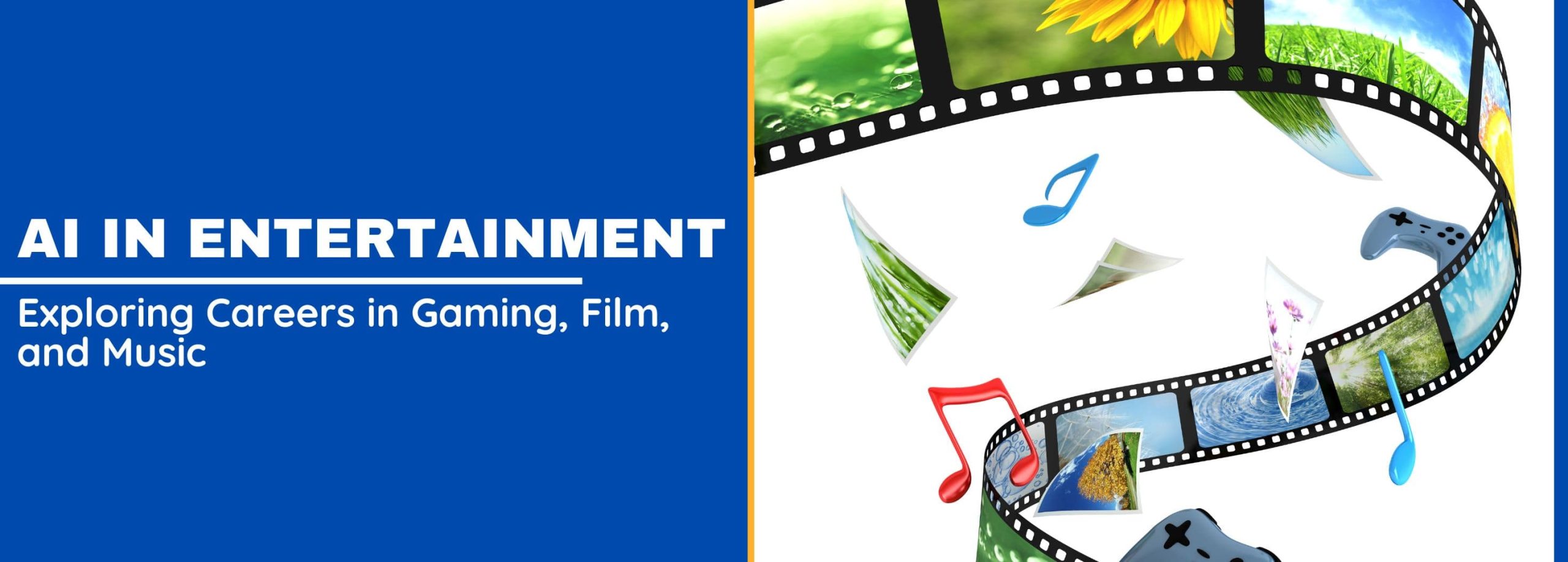AI in Entertainment: Exploring Careers in Gaming, Film, and Music

Artificial Intelligence (AI) is revolutionizing the entertainment industry, creating new possibilities in gaming, film, and music. This transformation offers exciting career opportunities for those with the right skills. This guide explores the impact of AI on entertainment and the careers available in this dynamic field.
Introduction
The integration of AI in entertainment is opening new avenues for innovation and creativity. From enhancing gameplay experiences in video games to revolutionizing film production and music composition, AI is reshaping the entertainment landscape.
The Role of AI in Entertainment
AI technologies, including machine learning, natural language processing, and computer vision, are being utilized to automate processes, create content, and personalize experiences. These advancements are leading to more immersive and engaging entertainment options.
AI in Gaming
Enhancing Gameplay
AI algorithms enhance gameplay by creating intelligent and adaptive non-player characters (NPCs). These NPCs can learn from player behavior, offering a more dynamic and challenging gaming experience.
Procedural Content Generation
AI is used to generate game content procedurally, including levels, environments, and scenarios. This allows for limitless variations and personalized gaming experiences.
AI-Powered Game Testing
AI-driven tools are employed to test games more efficiently, identifying bugs and optimizing performance. This speeds up the development process and ensures higher quality games.
AI in Film
Scriptwriting and Storytelling
AI algorithms assist in scriptwriting by analyzing successful screenplays and suggesting plotlines, dialogues, and character development. This enhances creativity and streamlines the writing process.
Visual Effects (VFX)
AI-powered tools are transforming visual effects in films, enabling the creation of realistic environments, characters, and special effects with greater efficiency and lower costs.
Audience Analysis and Personalization
AI analyzes audience preferences and viewing habits to tailor content recommendations and marketing strategies, ensuring a more personalized viewing experience.
AI in Music
Composition and Production
AI is being used to compose and produce music, generating melodies, harmonies, and even lyrics. These tools assist musicians in the creative process and enable the creation of unique sounds.
Music Recommendation Systems
AI-driven recommendation systems analyze listening habits and preferences to suggest new music, creating personalized playlists and enhancing user engagement.
Voice Synthesis and Modulation
AI technologies enable realistic voice synthesis and modulation, allowing for the creation of virtual singers and voice actors, as well as the modification of existing recordings.
Skills Needed for AI Careers in Entertainment
Programming and Software Development
Proficiency in programming languages such as Python, C++, and Java is essential. Knowledge of software development principles and practices is also crucial.
Machine Learning and Data Analysis
Understanding machine learning algorithms and data analysis techniques is important for developing AI-driven entertainment solutions.
Creativity and Artistic Skills
Creativity and an artistic eye are necessary to leverage AI tools effectively in creating compelling and engaging content.
Educational Pathways and Certifications
Pursuing degrees in computer science, AI, data science, or related fields is beneficial. Certifications from platforms like Coursera, edX, and Udacity can also enhance your credentials.
Building a Portfolio
A strong portfolio showcasing your AI projects in gaming, film, or music is essential. Include examples of AI-driven game elements, film VFX, or music compositions to demonstrate your skills.
Challenges and Ethical Considerations
Consider the ethical implications of AI in entertainment, including issues related to data privacy, copyright, and the potential for job displacement. Addressing these challenges responsibly is crucial.
Industry Trends and Future Prospects
Stay informed about industry trends such as AI-driven virtual reality, augmented reality, and interactive storytelling. Understanding these trends can position you for future opportunities.
Networking and Professional Development
Engage with industry professionals through conferences, meetups, and online communities. Networking helps in staying updated with trends and finding collaboration opportunities.
Conclusion
AI is transforming the entertainment industry, offering exciting career opportunities in gaming, film, and music. By developing the right skills and staying abreast of industry trends, you can thrive in this dynamic and innovative field.
FAQs
What programming languages are essential for AI careers in entertainment?
Proficiency in Python, C++, and Java is essential for developing AI-driven entertainment solutions.
How is AI used in game development?
AI enhances gameplay, generates content procedurally, and powers game testing, making the development process more efficient and the gaming experience more immersive.
What are some AI applications in the film industry?
AI assists in scriptwriting, enhances visual effects, and analyzes audience preferences for personalized content recommendations.
How can AI be used in music production?
AI can compose and produce music, create personalized recommendation systems, and enable realistic voice synthesis and modulation.
What skills are necessary for AI careers in entertainment?
Key skills include programming, machine learning, data analysis, creativity, and artistic abilities
Artificial Intelligence (AI) is revolutionizing the entertainment industry, creating new possibilities in gaming, film, and music. This transformation offers exciting career opportunities for those with the right skills. This guide explores the impact of AI on entertainment and the careers available in this dynamic field.
Introduction
The integration of AI in entertainment is opening new avenues for innovation and creativity. From enhancing gameplay experiences in video games to revolutionizing film production and music composition, AI is reshaping the entertainment landscape.
The Role of AI in Entertainment
AI technologies, including machine learning, natural language processing, and computer vision, are being utilized to automate processes, create content, and personalize experiences. These advancements are leading to more immersive and engaging entertainment options.
AI in Gaming
Enhancing Gameplay
AI algorithms enhance gameplay by creating intelligent and adaptive non-player characters (NPCs). These NPCs can learn from player behavior, offering a more dynamic and challenging gaming experience.
Procedural Content Generation
AI is used to generate game content procedurally, including levels, environments, and scenarios. This allows for limitless variations and personalized gaming experiences.
AI-Powered Game Testing
AI-driven tools are employed to test games more efficiently, identifying bugs and optimizing performance. This speeds up the development process and ensures higher quality games.
AI in Film
Scriptwriting and Storytelling
AI algorithms assist in scriptwriting by analyzing successful screenplays and suggesting plotlines, dialogues, and character development. This enhances creativity and streamlines the writing process.
Visual Effects (VFX)
AI-powered tools are transforming visual effects in films, enabling the creation of realistic environments, characters, and special effects with greater efficiency and lower costs.
Audience Analysis and Personalization
AI analyzes audience preferences and viewing habits to tailor content recommendations and marketing strategies, ensuring a more personalized viewing experience.
AI in Music
Composition and Production
AI is being used to compose and produce music, generating melodies, harmonies, and even lyrics. These tools assist musicians in the creative process and enable the creation of unique sounds.
Music Recommendation Systems
AI-driven recommendation systems analyze listening habits and preferences to suggest new music, creating personalized playlists and enhancing user engagement.
Voice Synthesis and Modulation
AI technologies enable realistic voice synthesis and modulation, allowing for the creation of virtual singers and voice actors, as well as the modification of existing recordings.
Skills Needed for AI Careers in Entertainment
Programming and Software Development
Proficiency in programming languages such as Python, C++, and Java is essential. Knowledge of software development principles and practices is also crucial.
Machine Learning and Data Analysis
Understanding machine learning algorithms and data analysis techniques is important for developing AI-driven entertainment solutions.
Creativity and Artistic Skills
Creativity and an artistic eye are necessary to leverage AI tools effectively in creating compelling and engaging content.
Educational Pathways and Certifications
Pursuing degrees in computer science, AI, data science, or related fields is beneficial. Certifications from platforms like Coursera, edX, and Udacity can also enhance your credentials.
Building a Portfolio
A strong portfolio showcasing your AI projects in gaming, film, or music is essential. Include examples of AI-driven game elements, film VFX, or music compositions to demonstrate your skills.
Challenges and Ethical Considerations
Consider the ethical implications of AI in entertainment, including issues related to data privacy, copyright, and the potential for job displacement. Addressing these challenges responsibly is crucial.
Industry Trends and Future Prospects
Stay informed about industry trends such as AI-driven virtual reality, augmented reality, and interactive storytelling. Understanding these trends can position you for future opportunities.
Networking and Professional Development
Engage with industry professionals through conferences, meetups, and online communities. Networking helps in staying updated with trends and finding collaboration opportunities.
Conclusion
AI is transforming the entertainment industry, offering exciting career opportunities in gaming, film, and music. By developing the right skills and staying abreast of industry trends, you can thrive in this dynamic and innovative field.
FAQs
What programming languages are essential for AI careers in entertainment?
Proficiency in Python, C++, and Java is essential for developing AI-driven entertainment solutions.
How is AI used in game development?
AI enhances gameplay, generates content procedurally, and powers game testing, making the development process more efficient and the gaming experience more immersive.
What are some AI applications in the film industry?
AI assists in scriptwriting, enhances visual effects, and analyzes audience preferences for personalized content recommendations.
How can AI be used in music production?
AI can compose and produce music, create personalized recommendation systems, and enable realistic voice synthesis and modulation.
What skills are necessary for AI careers in entertainment?
Key skills include programming, machine learning, data analysis, creativity, and artistic abilities




























